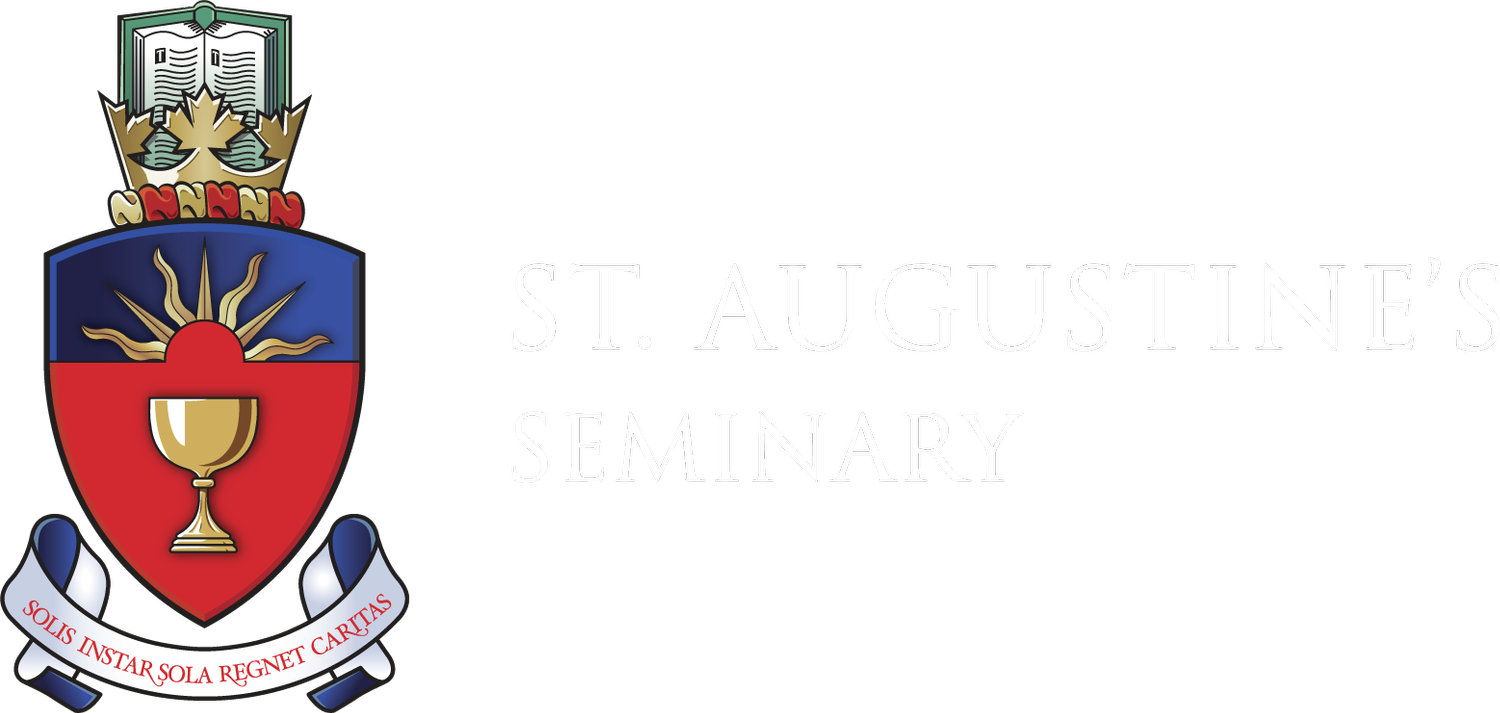Academic Policies & Procedures
Policies & Procedures
St. Augustine’s Seminary, in conjunction with the other member colleges of the Toronto School of Theology, has agreed upon the policies and procedures as outlined in the Toronto School of Theology Basic Degree Handbook. All students receive the handbook at registration. Where it does not cover a circumstance, the University of Toronto Rules and Regulations are applied.
Academic Admission Procedures And Academic Policies
Academic admission applications are available from the Registrar and may be requested from our website www.staugustines.on.ca. The academic application consists of a personal information form, a letter of intent and three letters of recommendation. Official transcripts from all post-secondary institutions (please see explanation below) are to be sent to the St. Augustine’s Seminary Registrar. Proof of Canadian citizenship, permanent residency or International Student Study Permit must be provided with the application and a non-refundable application fee of $25.00. Only complete academic applications will be forwarded to the Admissions Council. Students wishing to take courses for interest or to audit courses should contact the Registrar.
Official Transcripts Required for Admission
An "official" transcript is a transcript sent from one institution to another institution. At no point does such a transcript pass through the student's hands. Official transcripts are required from all previous post-secondary institutions that the applicant has attended, whether or not a degree program was completed at that institution. For example, if a student attended university A and then switched to university B, which granted transfer credit for the work done at A and eventually conferred the degree, official transcripts from both universities are required. If a student has completed credits for a thesis or independent study, detailed documentation must be provided to the Registrar concerning the topic(s)covered. Received supporting documents become the property of St. Augustine’s Seminary and cannot be returned or forwarded.
Academic Application Deadlines
September Start – First Term: July 15th
January Start – Second Term: November 30th
Summer Session Start First Semester: March 30th
Summer Session Start Second Semester: May 30th
Request for Fall Convocation: August 15th
Student Handbooks
The St. Augustine’s Student Handbooks can be accessed by using the menu on the left side. There are two handbooks: Conjoint Basic Degree Student Handbook, and a Non-Conjoint Student Handbook. These handbooks provide information on Student Web Services information, Payments, Email Policy, Student Services, St. Augustine’s Student Code of Conduct, Student Grievance Policy, Copyright Access, Extended Health Services, and SAS Policy on Discrimination and Harassment.
Duration of Studies
The time for completing a degree or diploma program will be planned in consultation with the academic adviser at the beginning of the student’s program. Except in extraordinary circumstances the duration for completing a degree program must not exceed eight academic years. Formation program requirements for the ordination stream may increase the duration by 2-3 years.
Leave of Absence
A student in a degree program may be granted up to one calendar year of parental, health, or compassionate leave. This period of leave does not count towards the maximum number of years during which the student must complete his or her program.
Academic Probation
When a student is admitted to studies at the Seminary with an academic record that contains low marks, acceptance may be conditional upon successful completion of the first term or year of studies. In these circumstances, the student will be "on academic probation". The Admissions Committee will review the academic record of the student after the set period of time and determine if the student is eligible to continue in the degree program.
Students may also be placed on academic probation as a result of a low cumulative average for the term. Academic probation is determined and reviewed by the Academic Dean of St. Augustine’s Seminary.
Policies & Procedures
St. Augustine’s Seminary, in conjunction with the other member colleges of the Toronto School of Theology, has agreed upon the policies and procedures as outlined in the Toronto School of Theology Basic Degree Handbook. All students receive the handbook at registration. Where it does not cover a circumstance, the University of Toronto Rules and Regulations are applied.
Advanced Standing, Shared Credits and Transfer Credits
St. Augustine’s Seminary follows the policies of the Association of Theological Schools in the United States and Canada for the granting of advanced standing credits, shared credits and transfer credits. Requests of this type are to be made in consultation with the Registrar.
Advanced Standing with credit is determined by an appropriate written and/or oral assessment of the student’s knowledge, competence, or skills that would normally be provided by the specific course for which they would receive advanced standing. Advanced Standing with credit cannot be automatically granted on the basis of ministerial or life experience or the content of undergraduate work. If advanced standing is granted with credit on the basis of appropriate evaluation, not more than one-fourth of the total credits required for an A.T.S. approved degree may be granted in this way.
Shared Credits are credits that were applied to another graduate degree program that St. Augustine’s has determined it will accept to its own degree program. The following rule applies: not more than half of the lesser degree will be transferred and not more than half of the credits required for the current degree are granted on the basis of transfer credits.
Transfer Credits: Students transferring from equivalent academic institutions are required to complete at least 2 semesters of full-time studies (10 one-semester courses) at St. Augustine's in order to be eligible for the degree.
Course descriptions must accompany transfer credit requests and official transcripts are required from the institution. The accreditation of the institution must be by the Association of Theological Schools in the United States and Canada or its equivalent. Only credits not applied to another degree are eligible for transfer. Unapplied credits may only be transferred for courses completed within the eight years preceding initial registration in a degree program. Please refer to the Toronto School of Theology Basic Degree Handbook or contact the St. Augustine’s Seminary Registrar for further information.
Standing Deferred – SDF (Extensions)
Students are to complete all course work and exams according to the professor's course syllabus. A seminarian who wishes to request an extension to submit work beyond the end of examination week in a term must first receive formational approval from the Rector. All other academic students must receive the permission of the Academic Dean.
Once approval has been received, the student should:
Obtain a standing deferred [SDF] request form from the Registrar, complete the top portion of the form and take it to the Academic Dean for his signature.
If approved, take the form to the professor of the course for approval; the professor completes the bottom portion of the form.
Ensure that the St. Augustine’s Seminary Registrar has a copy of the SDF form in case of a discrepancy in the academic records.
Course Load
Full-time students are normally required to take five courses per semester but must take at least four courses to receive full-time status per semester. A student may be allowed to enrol in six courses per semester with thepermission of the Academic Dean. Part-time students take three or fewer courses per semester.
A minimum grade of 70% (B-) is required to pass any course. Attendance at the classes is obligatory; the student must report any absence to the professor of the course, and seminarians to the Dean of Students.
Transcript Requests and Release of Student Information
St. Augustine’s Seminary does not release the official transcripts of its students without the expressed permission of the student. The cost of an official transcript is included in the fee schedule. The student and not a third party must request letters from the Registrar verifying the eligibility for graduation. Personal or academic information about a student is not provided to public requests. St. Augustine’s students are not part of the University of Toronto transcript module. You may request an official transcript through our website: https://staugustines.on.ca/transcripts
Outstanding Fees/Financial Holds: Transcripts will not be released for students with outstanding financial obligations to St. Augustine’s Seminary or the University. Requests by mail or by fax will be accepted but not processed until the financial HOLD is removed from their record.
Policy Statement on Discrimination and Harassment and Sexual Violence and Sexual Harassment
You can obtain a copy of our approved* Policy Statement on Discrimination and Harassment and our approved* Policy Regarding Sexual Violence and Sexual Harassment from the Director of Operations Office. Furthermore, St. Augustine’s Seminary has adopted the University of Toronto’s Policy on Sexual Violence and Sexual Harassment with Amendments in regards to all Students of SAS (the amendments document is also available upon request).
*Approved by the St. Augustine’s Seminary Board of Governors on June 11, 2018
Freedom of Information and Privacy Act
St. Augustine's Seminary and The University of Toronto respects your privacy.
Personal information that you provide to the University is collected pursuant to section 2(14) of the University of Toronto Act, 1971.
It is collected for the purpose of administering admissions, registration, academic programs, university-related student activities, activities of student societies, safety, financial assistance and awards, graduation and university advancement, and reporting to government.
The University is also required to report student-level enrolment-related data to the Ministry of Training, Colleges and Universities as a condition of its receipt of operating grant funding. The Ministry collects this enrolment data, which includes limited personal information such as Ontario Education Numbers, student characteristics, and educational outcomes, in order to administer government post-secondary funding, policies and programs, including planning, evaluation, and monitoring activities.
At all times it will be protected in accordance with the Freedom of Information and Protection of Privacy Act. If you have questions, please refer to www.utoronto.ca/privacy or contact the University Freedom of Information and Protection of Privacy Coordinator at McMurrich Building, Room 104, 12 Queen's Park Crescent West, Toronto, ON, M5S 1A8.

